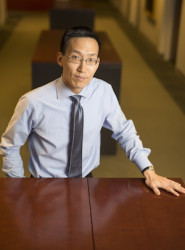 Excited Utterance, a podcast about evidence law and proof, has posted more than 25 interviews since its launch last fall by Vanderbilt Law School professor Edward K. Cheng.
Excited Utterance, a podcast about evidence law and proof, has posted more than 25 interviews since its launch last fall by Vanderbilt Law School professor Edward K. Cheng.
“The evidence world doesn’t have a regular conference,” said Cheng, professor of law at Vanderbilt. “Since we don’t regularly have a forum where all of us share our ideas, I wanted to create something like that, but I also didn’t want to run a full-scale conference every year.”
Among the already-posted interviews are:
- Erin Murphy of New York University School of Law on “Inside the Cell: The Dark Side of Forensic DNA”;
- Daniel Capra of Fordham University School of Law on “Electronically Stored Information and the Ancient Documents Exception”; and
- Andrea Roth of the University of California-Berkeley on “Machine Testimony,” about the complications of machines being used as witnesses.
On March 20, an episode on “Questioning Child Witnesses” featuring Thomas Lyon of the Gould School of Law at University of Southern California will be posted. To see the available and upcoming podcasts, go to the Excited Utterance website.
“There’s definitely a thumb on the scale for junior scholars,” Cheng said. “I like meeting junior scholars and thinking about their work.”
Cheng also likes to book scholars who research topics he doesn’t know much about, to help him keep up with the progress in his field along with his listeners. Most of the interviews are done by Skype, but some are done in person if circumstances make it possible.
A typical podcast draws about 500 listeners. It’s not verified, but Cheng has been told that some of his listeners don’t even work in evidence law and proof.
Excited Utterance is updated weekly during the academic year, which adds up to 28 episodes each year. Cheng, who was an engineer before going to law school, is able to manage the technical end of podcasting himself. Students and former students help with editing and selecting researchers to interview.
The title “Excited Utterance” comes from an exception to the hearsay rule in trials. The hearsay rule holds that testimony is not allowed about what a witness heard someone else say, instead of witnessing it personally. Excited utterances are an exception to the hearsay rule, for cases where a witness heard someone proclaim something during an exciting or startling event.
Excited Utterance is funded in part by the Branstetter Program in Litigation and Dispute Resolution at Vanderbilt Law School. Also, The Vanderbilt Institute for Digital Learning (VIDL) provided support through its microgrant program.